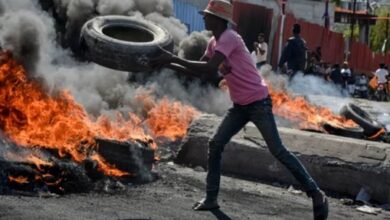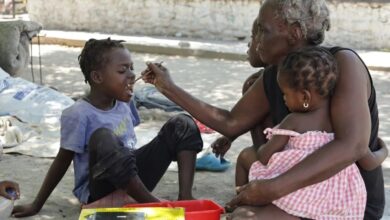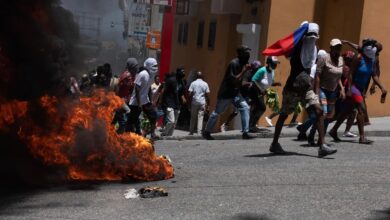Haiti’s Gang Warfare Ravages Agriculture, Sparks Famine
In Haiti, gang violence has escalated beyond the capital, devastating the vital Bas-Artibonite farming region leading to mass displacement, rampant food shortages, and urgent calls for international intervention.

Photo: 05/11/2021.- Aerial view of the thousands of houses in the Jalousie neighborhood today in Port-au-Prince (Haiti). EFE/ Orlando Barria
Latin American Post Staff
Listen to this article
Leer en español: La guerra entre pandillas en Haití devasta la agricultura y provoca hambruna
Haiti's Escalating Crisis: A Tragic Unfolding
In a tragic unfolding of events, Haiti, a nation already grappling with political and economic challenges, now faces an alarming escalation of gang violence that has spread from its capital to the Bas-Artibonite region, a crucial agricultural area. This surge in violence has displaced tens of thousands, severely impeding access to essential food staples and plunging the region into a humanitarian crisis.
In a recent report, the United Nations detailed Haiti's dire situation. Volker Turk, the U.N. High Commissioner for Human Rights, emphasized the urgent need for international security assistance, a request made by Haiti's government a year ago and only recently authorized by the U.N. This assistance, according to Turk, should be deployed "as soon as possible" to mitigate the crisis.
Bas-Artibonite Region Under Siege
The Bas-Artibonite region, north of the capital, is a lifeline for Haiti, a primary source of staple foods such as rice. However, the U.N. report paints a grim picture of the area, now besieged by violence, with approximately 22,000 people displaced amid rampant murders, looting, kidnappings, and widespread sexual violence. The report highlights the involvement of the region's most powerful gangs, which have aligned with the G-Pep alliance from the capital, indicating a strategic expansion of influence by these criminal networks.
Gangs armed with semi-automatic rifles and pistols have unleashed a wave of terror in Bas-Artibonite. They have resorted to burning houses, attacking irrigation systems, stealing crops and livestock, and imposing "taxes" on farmers for field access. Kidnappings for ransom and torture have become alarmingly frequent, with gangs initially targeting transport routes but now increasingly attacking residential neighborhoods. The U.N. report disturbingly notes the mass abductions and gang rapes of women and children.
Humanitarian Access Severely Restricted
This escalation of violence has severely restricted humanitarian access to the area, leaving victims of sexual violence reliant on underfunded rural associations. The pervasive fear of reprisals and a deep mistrust of the police have led to many victims not coming forward. The precarious security situation and dwindling funds have compelled aid groups to halt their operations or drastically reduce their budgets. The U.N.'s food agency estimates that nearly half the country is facing hunger, affecting over 45% of the Bas-Artibonite population.
Also read: Haiti's CARDH: Forced to Pause Amid Escalating Gang Violence
Turk described the situation as "cataclysmic" and reiterated the necessity to deploy the multinational security support mission to Haiti. He also called for more decisive action from the state, broader sanctions, and more robust controls on arms, which are believed to be primarily trafficked from the United States. Turk's statement underlines the severity of the crisis, with continued reports of killings, sexual violence, displacement, and other forms of violence, including attacks in hospitals.
Complex Interplay: Political Instability, Organized Crime, and Humanitarian Crises
The situation in Haiti is a stark reminder of the complex interplay between political instability, organized crime, and humanitarian crises. The escalation of gang violence in the Bas-Artibonite region not only threatens the lives and safety of thousands but also jeopardizes the food security of the entire nation. As the international community contemplates its response, the plight of the Haitian people hangs in the balance, underscoring the urgent need for effective and immediate intervention.





